 |  |  | |
|
An up close and personal interview with U.S. Coast Guard Veteran and Togetherweserved.com Member:
CWO3 Bill Hayden U.S. Coast Guard (Ret) (1969-1992)
PLEASE DESCRIBE WHO OR WHAT INFLUENCED YOUR DECISION TO JOIN THE COAST GUARD?
 The person that influenced my decision to join the Coast Guard most was my Father. In 1965 while boating on the Ohio River south of Cincinnati, Oh. We received a boating safety boarding. Up until that time I had been planning on joining the Navy when I turned eighteen. My father however knew how I loved boating and how impressed I was with the boarding event on the Ohio River so he asked me What about considering the Coast Guard instead of the Navy? I had not considered the possibility but immediately started doing my research. Needless to say, the more I learned about this small and unique service, the more I was hooked. The person that influenced my decision to join the Coast Guard most was my Father. In 1965 while boating on the Ohio River south of Cincinnati, Oh. We received a boating safety boarding. Up until that time I had been planning on joining the Navy when I turned eighteen. My father however knew how I loved boating and how impressed I was with the boarding event on the Ohio River so he asked me What about considering the Coast Guard instead of the Navy? I had not considered the possibility but immediately started doing my research. Needless to say, the more I learned about this small and unique service, the more I was hooked.
The rest is history now.
WHETHER YOU WERE IN THE SERVICE FOR SEVERAL YEARS OR AS A CAREER, PLEASE DESCRIBE THE DIRECTION OR PATH YOU TOOK. WHAT WAS YOUR REASON FOR LEAVING?
When I entered the Coast Guard late 1969 I didn't have a clue as to what I would be doing. I just wanted to be around the water. As I progressed through boot camp at Cape May however I determined that I wanted to become an Aviation Survival man. That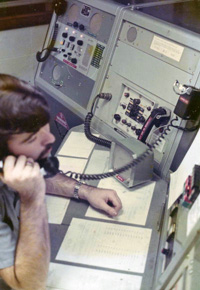 is until I learned that there was a two year waiting list for the school. I then inquired about Sonarman and received the same response. So I asked what else am I qualified for? I was told Electronics Technician and Radioman. Now I knew that my math skills at that time were sorely lacking and I would probably bomb out of ET school. So I told the Yeoman, the Morse Code will probably drive me nuts but put me down for RM school. February 1970 I found myself entering RM school at Governors Island, NY. is until I learned that there was a two year waiting list for the school. I then inquired about Sonarman and received the same response. So I asked what else am I qualified for? I was told Electronics Technician and Radioman. Now I knew that my math skills at that time were sorely lacking and I would probably bomb out of ET school. So I told the Yeoman, the Morse Code will probably drive me nuts but put me down for RM school. February 1970 I found myself entering RM school at Governors Island, NY.
The following August upon graduation I was sporting a third stripe and a proud new set of sparks. Telecommunications was now my trade. My first duty station as an RM was CGC Cook Inlet out of Portland, Maine.
After a couple of ocean station patrols we would deploy for service in Vietnam and would turn the ship over to the Republic of South Vietnam.
I would go on to serve aboard four other Cutters, two Group offices, an Air Station, two District offices and finally a Communication Station. I think as a Radioman the only duty stations I missed out on was aboard an Ice Breaker, Buoy Tender and a LORAN Station.
Overall, I think I punched most of the RM tickets.
IF YOU PARTICIPATED IN ANY MILITARY OPERATIONS, INCLUDING COMBAT, HUMANITARIAN AND PEACEKEEPING OPERATIONS, PLEASE DESCRIBE THOSE WHICH WERE THE MOST SIGNIFICANT TO YOU AND, IF LIFE-CHANGING, IN WHAT WAY.
 I think the most significant operation of my career was our deployment to South Vietnam in 1971. When we left Portland, Maine on 30 April 1971 I was still a green wet behind the ears Radioman. When I returned to the world later that year I was a very different person. We worked hard and we played hard. We participated in so many very dangerous operations with so very little sleep. I think the most significant operation of my career was our deployment to South Vietnam in 1971. When we left Portland, Maine on 30 April 1971 I was still a green wet behind the ears Radioman. When I returned to the world later that year I was a very different person. We worked hard and we played hard. We participated in so many very dangerous operations with so very little sleep.
I didn't fully understand how much I had learned during that deployment until I was assigned TAD aboard CGC Chase for the European Cadet cruise five months after I returned. Nobody in the Radio Gang had the experience of operating with Navy telecommunications systems that I had garnered while in Vietnam. Overnight, I became the go-to guy when problems arose or questions needed to be asked. It was quite a step up from being the junior Radioman aboard Cook Inlet several months earlier. They had a good Radio Gang aboard Chase that year. I'm just glad I was able to help out.
OF ALL YOUR DUTY STATIONS OR ASSIGNMENTS, WHICH ONE DO YOU HAVE FONDEST MEMORIES OF AND WHY? WHICH ONE WAS YOUR LEAST FAVORITE?
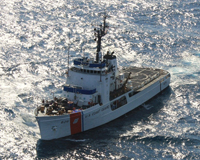 I think my favorite duty station was my tour aboard CGC Dependable home ported in Panama City, Fl. 1974-77. I had just returned from a ten month break in service and was an RM2 which I considered to be the rocking chair position. I wasn't the Radioman-in-Charge but I also wasn't the low man either. I had just married my wonderful wife Barbara and life was good. I was a crew-member of at 210' WMEC that did a fair amount of SAR work and my fellow crew members were first rate. I think my favorite duty station was my tour aboard CGC Dependable home ported in Panama City, Fl. 1974-77. I had just returned from a ten month break in service and was an RM2 which I considered to be the rocking chair position. I wasn't the Radioman-in-Charge but I also wasn't the low man either. I had just married my wonderful wife Barbara and life was good. I was a crew-member of at 210' WMEC that did a fair amount of SAR work and my fellow crew members were first rate.
I think my least favorite would be my tours at the First District Communications Center, and Ninth District Telecommunications Staff. It has nothing to do with the good folks I worked with in Boston and Cleveland but rather I was much more at home afloat and in the field. If I didn't have a keel under me with seawater passing beneath, I felt very out of place.
FROM YOUR ENTIRE SERVICE, INCLUDING COMBAT, DESCRIBE THE PERSONAL MEMORIES WHICH HAVE IMPACTED YOU MOST?
I think the event that impacted me the most was loosing one of my junior Radiomen in a motorcycle accident while serving as RMC aboard CGC Jarvis. We were in port Honolulu when it occurred and I was the JOOD that evening. It's tough enough when you learn that you may have lost one of your own. I however, had to go to the scene and positively identify the remains of RMSN Butch Bell that night. Young and reckless, I saw so very much of myself in him when I was younger.
I still think of him often and wonder what could have been. RIP Butch. You are very missed.
WHAT ACHIEVEMENT(S) ARE YOU MOST PROUD OF FROM YOUR MILITARY CAREER?
I think that there are two achievements of which I am proud of. First I remember sitting in Sick Bay at Cape May in late 1969 when I first laid eyes on a Chief Warrant Officer. I marveled and was humbled in the presence of this sailor. Never in my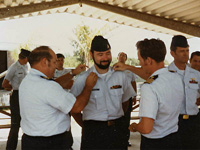 wildest dreams did I imagine that I too, many years later, would achieve this rank. In June 1986 I put my anchors away and joined the Officer Corps. I would learn that as I was humbled as an SR in Cape May many years before. The responsibilities upon promotion to CWO2 were just as humbling. It was the correct career path for me and I have no regrets. wildest dreams did I imagine that I too, many years later, would achieve this rank. In June 1986 I put my anchors away and joined the Officer Corps. I would learn that as I was humbled as an SR in Cape May many years before. The responsibilities upon promotion to CWO2 were just as humbling. It was the correct career path for me and I have no regrets.
The second would be achieving the rank of RMC and being assigned as the Radioman in Charge aboard a High Endurance Cutter. The significance of this goes back to my first unit out of RM school (Cook Inlet). Other than one other of the Radiomen assigned (RM1 Bill Potts) I would go on and become the only other Radioman from that original Radio Gang that would return to the RMIC position aboard a WHEC.
OF ALL THE MEDALS, AWARDS, FORMAL PRESENTATIONS AND QUALIFICATION BADGES YOU RECEIVED, OR ANY OTHER MEMORABILIA, PLEASE DESCRIBE THOSE WHICH ARE THE MOST MEANINGFUL TO YOU AND WHY?
I think there are three. Vietnam Service Medal, Vietnam Campaign Medal, and my permanent Cutterman's pin.
WHICH INDIVIDUAL(S) FROM YOUR TIME IN THE MILITARY STAND OUT AS HAVING THE MOST POSITIVE IMPACT ON YOU AND WHY?
There are two individuals that stand out. First CDR William F. Merlin (later RADM Merlin) who was my CO aboard Dependable 74-77. After chewing me a new one for my sound-powered telephone mistakes he then directed me to conduct a telephone talker training lecture the following day for the entire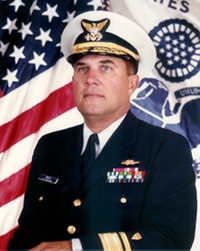 crew and I had never done any public speaking before. Needless to say I was quite nervous. I didn't realize it at the time but would later understand that he was pushing me out of my shell and made me realize that I was capable of much more. crew and I had never done any public speaking before. Needless to say I was quite nervous. I didn't realize it at the time but would later understand that he was pushing me out of my shell and made me realize that I was capable of much more.
Second would be LCDR Ted Musselman. He was the Group Commander at Group Cape Hatteras NC 1977-79. Cape Hatteras was a small group office with PO1's as department heads. As the RM1 I wore multiple hats. I was not only the RM in Charge but I was also Group Ops. LCDR Musselman bestowed another dubious title upon me whenever he had a special project. I would become his Project Coordinator. My fellow PO1's found humor in awarding me with my own hard hat with Project Coordinator emblazoned upon it. Like CDR Merlin before him, LCDR Musselman was forcing me to push the limits of my own envelope. He believed in me and was always pushing me to do more wanting me to believe in myself. In retrospect, I came to understand that we as leaders are supposed to teach values to those who expect to follow us.
PLEASE RECOUNT THE NAMES OF FRIENDS YOU SERVED WITH, AT WHICH LOCATION, AND WHAT YOU REMEMBER MOST ABOUT THEM. INDICATE THOSE YOU ARE ALREADY IN TOUCH WITH AND THOSE YOU WOULD LIKE TO MAKE CONTACT WITH.
There are so many to recall. I'm afraid that I may overlook somebody but I think from boot camp it would be Phillip Gall from company Whiskey-10. We met in forming company and became good friends. He would go on to storkeeper school and we lost touch after that. The original radio gang from Cook Inlet. RM1 Bill Potts, RM1 Ralph King, RM2 Art Pightling, RM2 Ken Filburn, RM2 Dick Drost, RM3 Abe Galonski, RM3 Dick Seng, RM3 Tony Bryant, RM3 Mike Sidlecki and of course RMCS Robert (Bobby) Ward. The radio gang was affectionately referred to as Robert's Raiders. Another good friend aboard Cook Inlet was SN Richard Penneman. I could probably go on but the list would be extensive so I'll stop here.
CAN YOU RECOUNT A PARTICULAR INCIDENT FROM YOUR SERVICE WHICH MAY OR MAY NOT HAVE BEEN FUNNY AT THE TIME, BUT STILL MAKES YOU LAUGH?
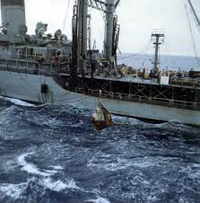 During our Vietnam deployment while aboard Cook Inlet, we performed many underway replenishment in order to receive fuel, ammo, groceries, mail, etc. One day we found ourselves doing an UNREP with USS Taluga off of Vung Tau. We were connected up and transferring fuel and stores when the two ships got dangerously close. So close as a matter of fact that our starboard quarter and Taluga's port quarter kissed off of one another. Of course this set the emergency breakaway procedure into motion and by the time everything was disconnected, Taluga's rigging was a mess and trailing in the water down her port side. Not to be deterred, our CO sent a message to Taluga via signal light that he wanted to come alongside and re-attempt the UNREP. Needless to say, Taluga flatly refused and for some unknown reason, I don't believe we ever had another opportunity to UNREP with them again during the rest of our deployment. I can't imagine why? During our Vietnam deployment while aboard Cook Inlet, we performed many underway replenishment in order to receive fuel, ammo, groceries, mail, etc. One day we found ourselves doing an UNREP with USS Taluga off of Vung Tau. We were connected up and transferring fuel and stores when the two ships got dangerously close. So close as a matter of fact that our starboard quarter and Taluga's port quarter kissed off of one another. Of course this set the emergency breakaway procedure into motion and by the time everything was disconnected, Taluga's rigging was a mess and trailing in the water down her port side. Not to be deterred, our CO sent a message to Taluga via signal light that he wanted to come alongside and re-attempt the UNREP. Needless to say, Taluga flatly refused and for some unknown reason, I don't believe we ever had another opportunity to UNREP with them again during the rest of our deployment. I can't imagine why?
WHAT PROFESSION DID YOU FOLLOW AFTER YOUR MILITARY SERVICE AND WHAT ARE YOU DOING NOW? IF YOU ARE CURRENTLY SERVING, WHAT IS YOUR PRESENT OCCUPATIONAL SPECIALTY?
After my retirement the summer of 1992, I went to work at The Home Depot in Pensacola, Fl. After six months, I decided to go back to school to earn my AS-EET degree. I then worked for the Florida Dept. of Transportation for six years as a senior roadway construction inspector. I then returned to school to earn a second degree in drafting and design. I then served for nine years with the Escambia County Property Appraiser managing the geographic information systems dept.
I fully retired the summer of 2013 and find myself to be busier than before I retired.
WHAT MILITARY ASSOCIATIONS ARE YOU A MEMBER OF, IF ANY? WHAT SPECIFIC BENEFITS DO YOU DERIVE FROM YOUR MEMBERSHIPS?
I am a member at large of the Coast Guard Chief Petty Officers Association. I am also the Chairman of the local Coast Guard Friends & Family/Pensacola Retiree Association.
IN WHAT WAYS HAS SERVING IN THE MILITARY INFLUENCED THE WAY YOU HAVE APPROACHED YOUR LIFE AND YOUR CAREER?
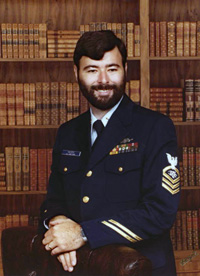 I think I can sum this up with two words: Loyalty and Honor. These are two distinct values that became the cornerstone of my Coast Guard career. I would take these values with me into my post-Coast Guard career and wherever I found these values to be lacking in the workplace, I would attempt to plant those seeds in order to create a better work environment. I think I can sum this up with two words: Loyalty and Honor. These are two distinct values that became the cornerstone of my Coast Guard career. I would take these values with me into my post-Coast Guard career and wherever I found these values to be lacking in the workplace, I would attempt to plant those seeds in order to create a better work environment.
BASED ON YOUR OWN EXPERIENCES, WHAT ADVICE WOULD YOU GIVE TO THOSE WHO HAVE RECENTLY JOINED THE COAST GUARD?
I would convey the same advice I received upon entering the Coast Guard in 1969. The Coast Guard is what you make of it. Life is nothing more than a series of choices. Make the right choices and good things will happen. Make the wrong choices, you better take a look in the mirror and ask yourself what you could have done better.
IN WHAT WAYS HAS TOGETHERWESERVED.COM HELPED YOU REMEMBER YOUR MILITARY SERVICE AND THE FRIENDS YOU SERVED WITH.
TWS has enabled me to re-connect with many shipmates from long ago. It is also a great repository of my personal career information.
|



Read Other Interviews in the TWS Voices Archive
|
|
Share this Voices Edition on:
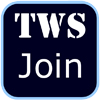
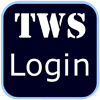
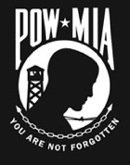  |
|
TWS VOICES
TWS Voices are the personal stories of men and women who served in the US Military and convey how serving their Country has made a positive impact on their lives. If you would like to participate in a future edition of Voices, or know someone who might be interested, please contact TWS Voices HERE.
This edition of CoastGuard Voices was supported by:

CoastGuard.Togetherweserved.com
For current and former serving Members of the US Coast Guard and US Coast Guard Reserve, TogetherWeServed is a unique, feature-rich resource enabling Coast Guardsmen to re-connect with lost Shipmates, share memories and tell their Coast Guard story.
To join CoastGuard.Togetherweserved.com, please click HERE.
| |